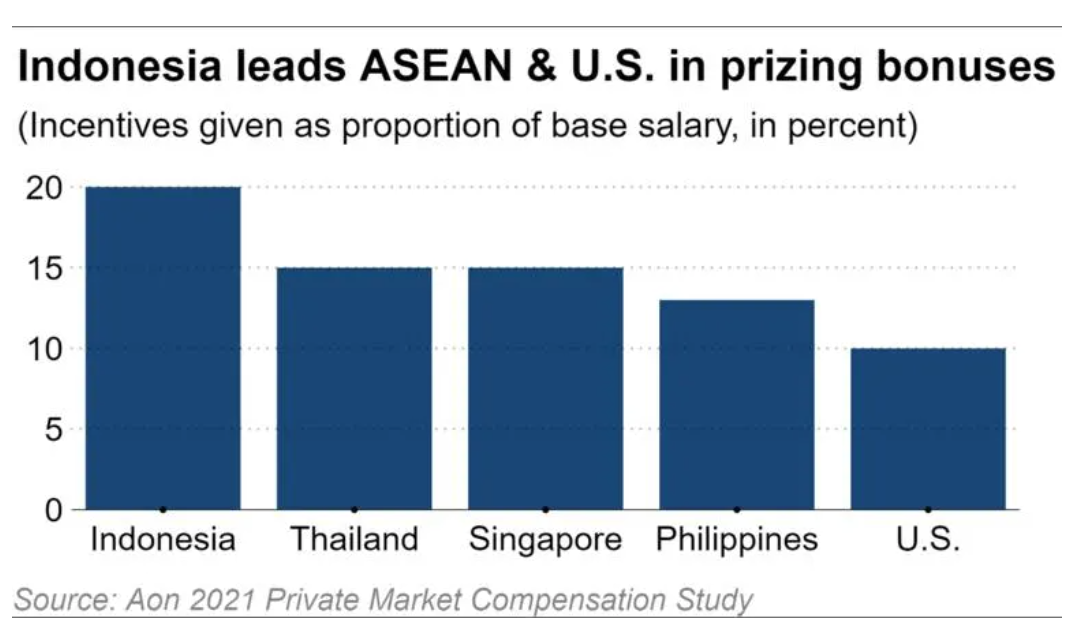Indonesia’s startups are more willing to dole out bonuses to tech talent compared to peers in Singapore, Thailand, the Philippines, and the US, according to a survey of venture capital-funded companies by consultancy Aon.
The Association of Southeast Asian Nations’ most populous country recorded the highest level of performance incentives as a proportion of base salaries given to skilled professionals, according to the study, released this week.
Indonesia’s upstarts were willing to pay a 20% premium on top of basic pay packages to reward the likes of technology specialists, compared with 15% in Singapore and Thailand, and 13% in the Philippines.
“The reason why Indonesian firms are a little more aggressive on the bonus plans is because the availability of great tech talent from within the market is slightly less,” explained Ravi Nippani, an associate partner at Aon. “I’m not saying [compared] with other Asia markets, but with a market like Singapore.”
Nippani added that some of the talent Indonesia’s startups were targeting have worked with multinational companies or well-established organizations, where bonus schemes tend to be more generous, and so the upstarts have had to raise the bar.
Believed to be the first of its kind in the region, Aon’s study of privately held companies polled more than 100 startups across Southeast Asia from sectors like e-commerce, food delivery, financial technology, and ride-hailing in the first three months of the year.
It benchmarked the region to the more mature tech landscape of the US and found US startups lagging behind their ASEAN counterparts by offering 10% bonuses over base salaries.
“US startups are not big on bonuses,” Nippani said. “They’ve kind of reached the stage where they feel bonuses are not driving the kind of characteristics they want, so a lot of them … added that amount onto the base salary or kept it to a minimum.”

In Southeast Asia, the battle for talent is heating up as startups look for skilled professionals to fuel growth amid moves to raise capital; or combine with peers in asserting dominance over the developing region.
Singapore super app developer Grab in April announced it would go public in the US via a SPAC listing, which would value the startup at USD 39.6 billion.
Also known as a “blank check” company, a SPAC is a listed shell corporation set up with the intent to acquire an unlisted target company. This allows the target company to list on public exchanges without having to go through the arduous vetting process associated with Initial Public Offerings.
The SoftBank Group-backed Grab and Singapore Telecommunications, Southeast Asia’s largest telco, also jointly won a license from Singapore authorities to operate a digital bank in the city-state. Grab has been posting job openings to kick-start the virtual banking business, advertising for positions like Lead Product Designer and Senior Data Scientist.
Gojek, Grab’s Indonesian rival, said in May it would merge with e-commerce platform Tokopedia to create one of ASEAN’s biggest tech conglomerates, the GoTo Group, which will cover everything from ride-hailing and digital payments to online shopping.
Southeast Asia’s importance to digital companies is widely recognized. The gross merchandise value of the region’s internet economy is expected to grow threefold to USD 300 billion by 2025 from 2020, according to research by Google, Temasek and Bain & Co.
While ASEAN’s upstarts chase top talent to help achieve growth in the bloc’s vast consumer markets, Aon’s study suggests these companies are still relatively conservative in cobbling together basic pay packages for skilled individuals.
The survey pegs the annual base salary of senior professionals at US startups at around USD 178,600—roughly three times higher than Southeast Asia’s benchmark of about USD 55,700, excluding Singapore, which was around USD 133,900.
But remuneration is not the only factor in attracting skilled tech workers, said Juliana Lim at Singapore’s state-owned venture capital company SGInnovate.
“Most people are attracted to join a startup because they feel there’s something they can do that is very impactful very early on,” she said, noting that employment opportunities have opened up, with companies increasingly willing to hire remote workers.
Tech companies should offer meaningful work for those they hire, with collaboration among teams key in startups, which typically adopt leaner employee structures, Lim said, noting how young companies can offer lucrative benefits based on company performance.
“We have experiences where someone has joined as a very young person in a small role, but then [grew into a bigger role] and eventually even lead the team because they are growing that company together with the founders.”
This article first appeared on Nikkei Asia. It’s republished here as part of 36Kr’s ongoing partnership with Nikkei.
